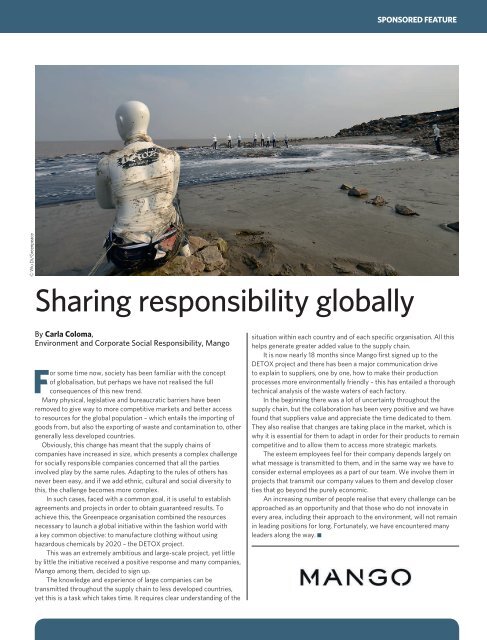FAMBB
FAMBB
FAMBB
Create successful ePaper yourself
Turn your PDF publications into a flip-book with our unique Google optimized e-Paper software.
SPONSORED FEATURE© Wu Di/GreenpeaceSharing responsibility globallyBy Carla Coloma,Environment and Corporate Social Responsibility, MangoFor some time now, society has been familiar with the conceptof globalisation, but perhaps we have not realised the fullconsequences of this new trend.Many physical, legislative and bureaucratic barriers have beenremoved to give way to more competitive markets and better accessto resources for the global population – which entails the importing ofgoods from, but also the exporting of waste and contamination to, othergenerally less developed countries.Obviously, this change has meant that the supply chains ofcompanies have increased in size, which presents a complex challengefor socially responsible companies concerned that all the partiesinvolved play by the same rules. Adapting to the rules of others hasnever been easy, and if we add ethnic, cultural and social diversity tothis, the challenge becomes more complex.In such cases, faced with a common goal, it is useful to establishagreements and projects in order to obtain guaranteed results. Toachieve this, the Greenpeace organisation combined the resourcesnecessary to launch a global initiative within the fashion world witha key common objective: to manufacture clothing without usinghazardous chemicals by 2020 – the DETOX project.This was an extremely ambitious and large-scale project, yet littleby little the initiative received a positive response and many companies,Mango among them, decided to sign up.The knowledge and experience of large companies can betransmitted throughout the supply chain to less developed countries,yet this is a task which takes time. It requires clear understanding of thesituation within each country and of each specific organisation. All thishelps generate greater added value to the supply chain.It is now nearly 18 months since Mango first signed up to theDETOX project and there has been a major communication driveto explain to suppliers, one by one, how to make their productionprocesses more environmentally friendly – this has entailed a thoroughtechnical analysis of the waste waters of each factory.In the beginning there was a lot of uncertainty throughout thesupply chain, but the collaboration has been very positive and we havefound that suppliers value and appreciate the time dedicated to them.They also realise that changes are taking place in the market, which iswhy it is essential for them to adapt in order for their products to remaincompetitive and to allow them to access more strategic markets.The esteem employees feel for their company depends largely onwhat message is transmitted to them, and in the same way we have toconsider external employees as a part of our team. We involve them inprojects that transmit our company values to them and develop closerties that go beyond the purely economic.An increasing number of people realise that every challenge can beapproached as an opportunity and that those who do not innovate inevery area, including their approach to the environment, will not remainin leading positions for long. Fortunately, we have encountered manyleaders along the way.


